Alhamdulillah, there are more and more quality resources for teaching children about Islam. But how do you know what is right for you? Should you try to incorporate Islam into every subject by using Islamically integrated resources or should Islamic Studies have its own focused time?
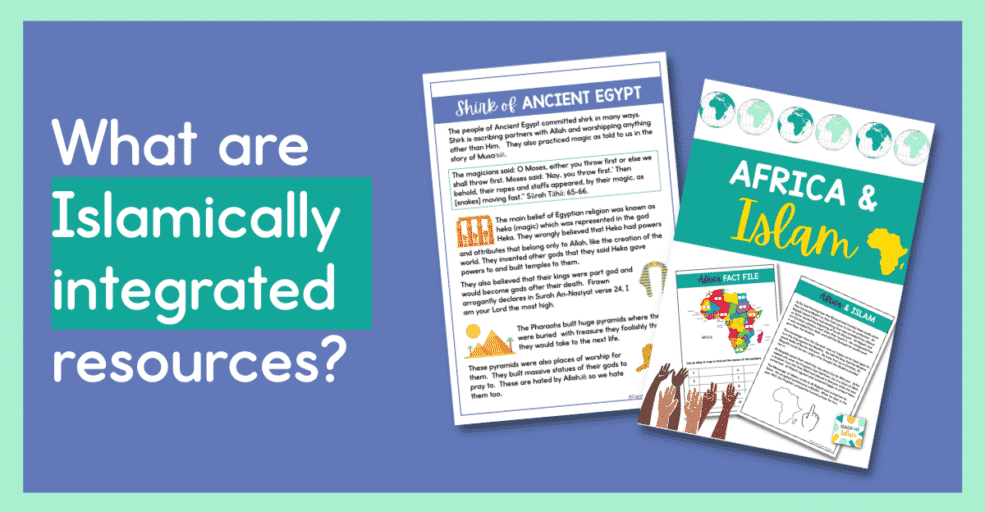
What are Islamically integrated resources?
I first saw this term around a year ago and since then I have seen it everywhere. It is a term coined to describe a resource that incorporates Islam into the subject matter. An example would be a science unit on water, it may include ayat from the Qu’ran about water, the prohibition of wasting water, using water for wudhu, the blessing of rain, Prophetic miracles that concerned water and so much more. These topics would not be covered in a standard textbook and it is brilliant to see more and more resources like these becoming available to Muslim families.
What is meant by Islamic Studies?
Islamic Studies for kids often means but is not limited to, Aqeedah, Tafsir, Hadith, Fiqh and Seerah. These are important subjects for kids to learn and contain true obligatory knowledge. Our kids need to know the correct Aqeedah, how to pray, fast and fulfil their duties. The content must be taught and by setting aside a specific time, it can be covered methodically and comprehensively inshaAllah.
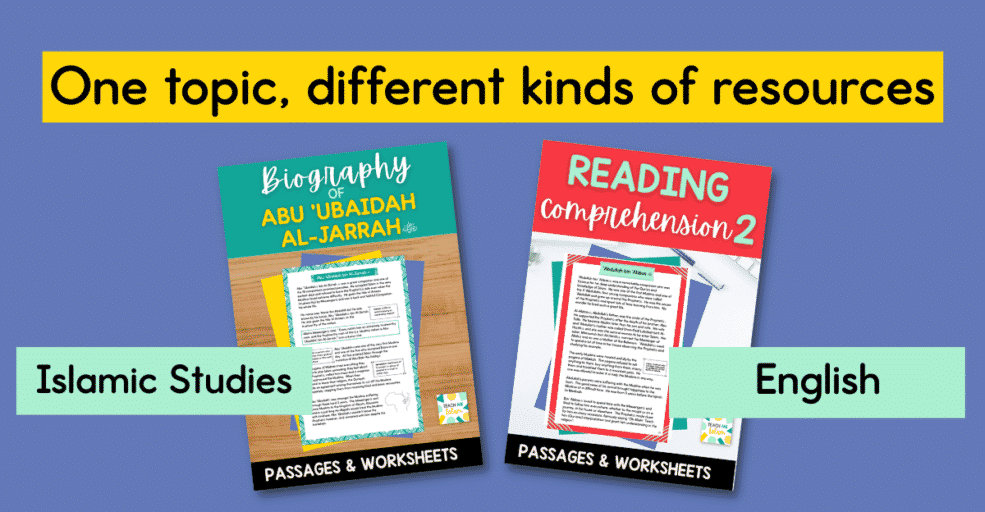
One topic, different kinds of resources.
An example of how one kind of subject matter can be used for two different subjects are the biography resources that I created. The Abu ‘Ubaidah bin Al-Jarrah (may Allah be pleased with him) biography pack, contains a reading passage and worksheets about the passage. The main objective is to teach kids about the life of this great Companion. You can grab your free copy here. The Reading Comprehension Pack about child Companions is aimed to be used as part of an English lesson. It contains questions about grammar, parts of speech, punctuation and more. It is an Islamically integrated resource, it has Islamic content as its base but it is used for a lesson other than Islamic Studies with additional learning objectives in mind.
So which one should you choose?
Well, ideally you wouldn’t choose, you would do both. Integrate Islam into all other subjects and teach Islamic Studies as well during dedicated lesson time. However, it really depends on your individual circumstances. Not everyone homeschools and even if they do they might not have the capacity to do both. It takes a lot of time to design an Islamically integrated curriculum. The planning, designing, creating all take time and practice that busy homeschool mothers sometimes just don’t have. I’ve purchased Islamically integrated resources to teach my kids even though I enjoy making my own. I realised that I was wasting lesson time because I hadn’t had time to prepare the material beforehand. When I bought the unit studies, not only was it a relief but the resources were more beautiful than anything I could have made myself.

What are the benefits of Islamically integrated resources?
There are lots of benefits of integrating Islam into your homeschool curriculum and some are touched upon in this blog post about when secular studies take up too much of your homeschool time. Integrating Islam teaches kids that their deen is connected to all aspects of their life. It helps to apply Islamic principles to subjects that otherwise might seem separate. An example of this is history, the historian gathers as much information as possible with a view to preserving it and a hadith scholar for instance is concerned with assessing authenticity. Huge swathes of historical knowledge would not even meet the requirements for a hadith to be called ‘weak’. When you teach your kids Islamic history, it naturally sparks conversations about verifying the authenticity of reports, how we can assess authenticity and the qualities of a reliable narrator. It can also lead to reflecting on Allah’s perfect names and attributes, how He alone knows everything, and how he deserves to be worshipped. This is all material that cannot be found in a textbook you can purchase from Amazon.
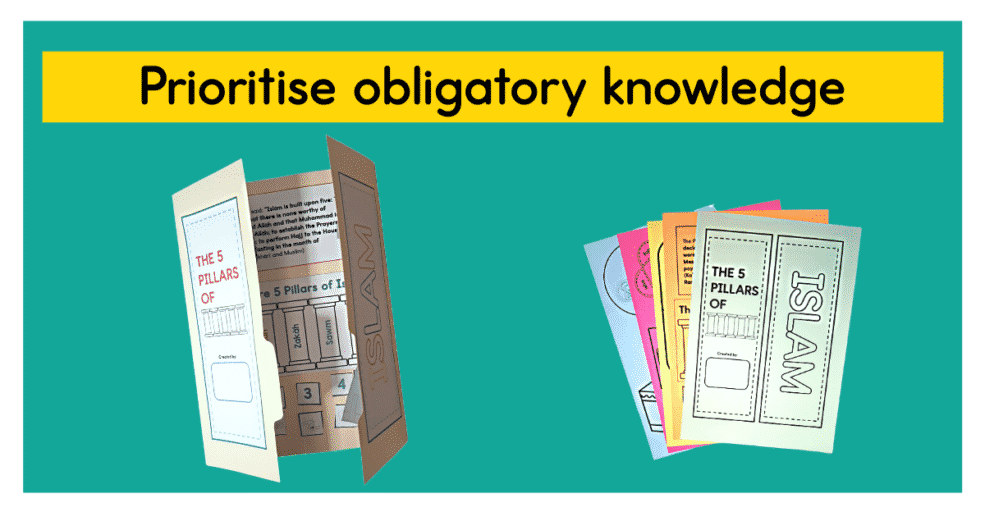
Can you use Islamically integrated resources if your kids go to school?
As a principle of our religion, we always prioritise fulfilling our obligations first. Therefore, teach your kids what they need to know. This will be different according to the age of the child. A child of 5 will be learning about Allah and a child of 7 will be learning wudhu and how to pray. Additionally, it will depend on their circumstances. A child that lives near Makkah will need to know how to perform umrah before a child who lives thousands of miles away without the immediate prospect of visiting Makkah.
Plus there is always the weekend and holidays! Kids are natural learners and you can cover an Islamic Unit Study over several weeks. Just complete a lesson every Friday. Most units I know can be taught in a short period of time and are engaging and fun.
If your kids go to a school that isn’t Islamic this is an excellent idea. They will be spending the majority of their education looking at the world through a certain lens so Islamic input and perspective are vitally important. You can read all about the importance of representation in a Muslim child’s education here.
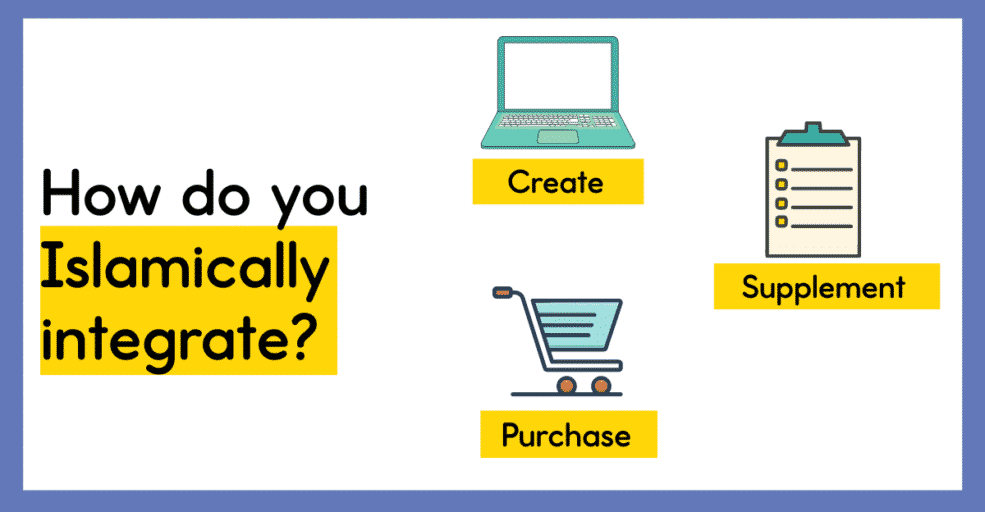
How do you Islamically integrate?
There are lots of ways to incorporate Islam into subjects other than Islamic Studies. This probably warrants its own blog post. Here are some ideas briefly outlined.
- Make your own unit from start to finish.
Choose your topic, brainstorm Islamic related content, research and then plan. For example: Insects. Bees in the Qur’an, benefits of honey, Allah heals us and sends us medicines and cures, ants in the qur’an, the story of Sulayman, flies, Allah is the best of creators.
Pros: You can design it exactly how you want. You can follow your child’s interests.
Cons: It takes a lot of time. You may not have developed the skills yet to make it to the quality you would like.
- Incorporate Islamic content into your ready-made curriculum.
You may be following a set syllabus and using textbooks or other materials. Just research Islamic related content to the topic and add it as an extra activity or lesson. This could be as simple as one worksheet or it could be a couple of extra lessons to extend a topic.
Pros: It is a time saver. You can choose how much you would like to supplement. You are introducing Islamic content without having to invest a lot of time or money.
Cons: It can make Islamic content seem like an add-on rather than the main event. Your content may seem less ‘professional’ and appealing than the expertly made textbook or other materials. (This does not have to be the case at all, I’m just covering all bases)
- Purchase an already made unit.
Browse for resources you think would interest your child. Check for authenticity and quality. I would look very closely at age ranges as well. Some resources are designed to be completed independently and others will require some assistance or teaching. It’s important that you find a match for your family and their requirements. For example, if you have a range of ages including younger kids, you do not want lots of information and worksheets. If you have just older kids it is likely they will not enjoy cutesy crafts.
Pros: Time-saving. Better quality and more attractive than you may be able to create yourself (the talent of some Muslim creators really astounds me Allahumma barik). Tried and tested.
Cons: Cost. Homeschoolers are often on a budget and lots of unit studies can add up. Not tailor-made to your child. Sometimes not all the material is suited to your child.
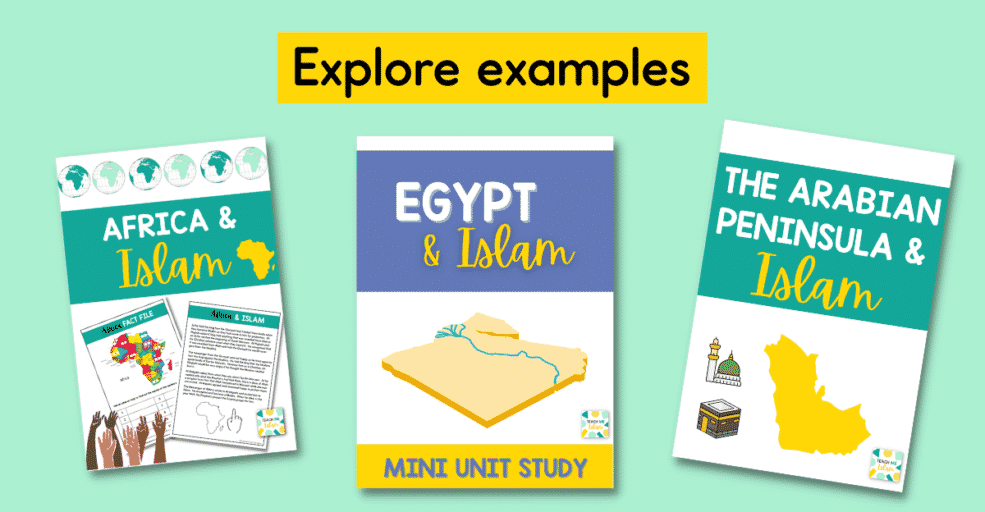
If you would like to see an example of an Islamically Integrated Unit Study, you can see the following units here:
🌍Find the African and Islam Unit Study here. It contains 6 lessons that cover geography, history and Islamic Studies with beneficial and fun activities.
🌍You can find a mini-unit on Egypt and Islam here.
❤️Finally my personal favourite, the Arabian Peninsula Unit Study is available here and the first lesson can be downloaded for free here
These units have a stronger emphasis on Islamic content and many lessons could be part of an Islamic Studies lesson. For units that are based on scientific topics with great Islamic content woven in, check out Homeschool Queens.
Here are some other blog posts you may be interested in:
How to teach Islamic content all day long
5 ways to make your Muslim homeschool more productive
6 Teaching Techniques to Teach Kids of Different Ages
7 surprising ways they teach Islamic Studies in Muslim countries

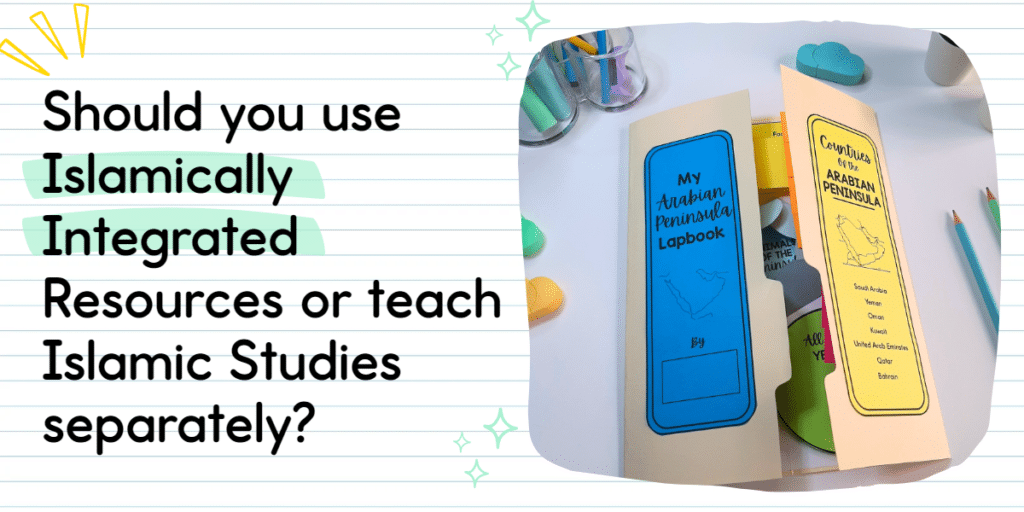


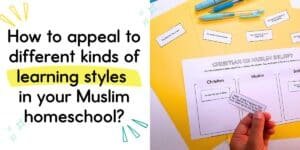
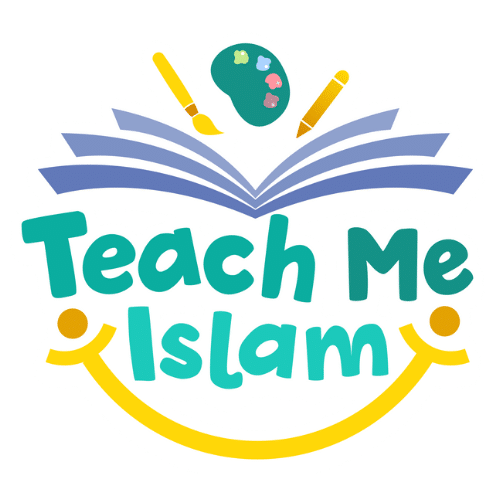
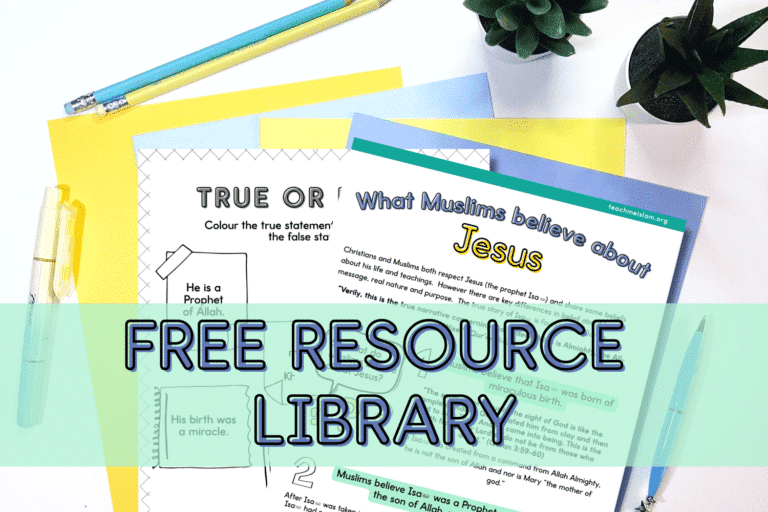
2 responses
Asalamualykum wa rahmatullah.
Jazakallahukhairn for all the freebies and items available for sale, absolutley fantastic mashaaAllaah.
I prefer intergrated,
To be honest we do not use any curriculum. We have a more of a holistic/ child led type type approach I guess.
Years ago I remember a sister using the Quran as her basis for all the childrens education and this really resonated with me especially after hearing a lecture whereby the brother mention they would learn the Quran first before everything else as that way they would know what was halal/ haram etc.
The sister herself was a Quran teacher mashaAllaah so she would go through word for word with her older children, I think the eldest at the time was about 7.
These sessions would then trigger interests in things, when they came to the ayat about clouds for example they would do the water cycle, spiders, bees, mountains etc
For me personally I see what the children are interested in and try to facilitate for them, but I also show them what I am interested in and let them see me learn something new, even if I struggle.
I let them see me research sometimes get them to help too. If I am totatlly stumpled I try to get someone
who knows more to show them what they are looing into.
Wa alaikum asalaam wa rahmatullah wa barakaatuh! Jazakallah khair for your kind comment. I love the idea of following your child’s interest, showing them you’re learning too and consulting people who know more. Great life lessons there! Barakallah feeki for sharing.